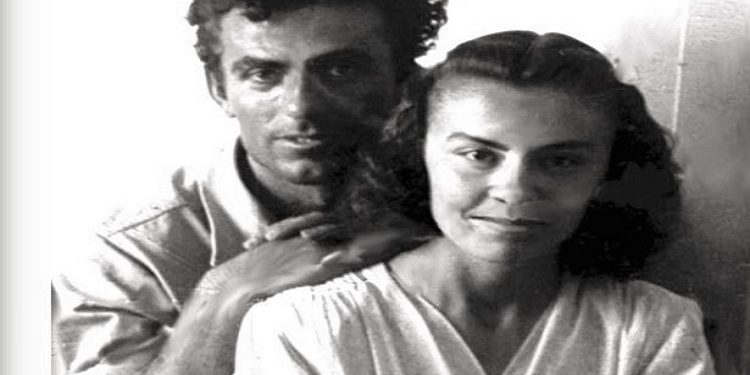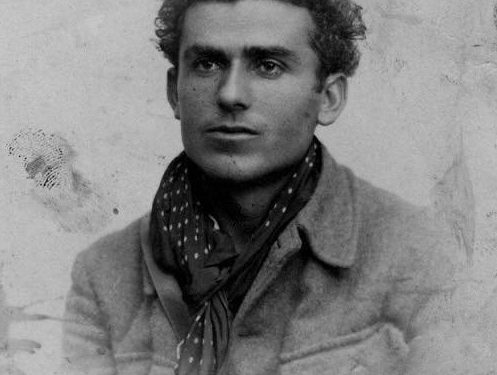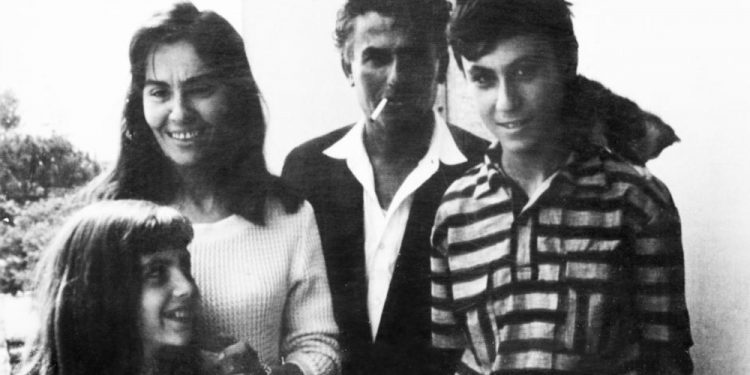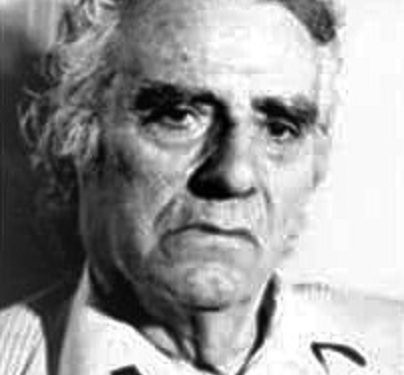By Petro Marko
Part eight
Memorie.al / The confessions of the well-known writer Petro Marko, former fighter of the Internationalist Brigades in the War of Spain in 1936, and then also of the anti-fascist resistance in Tirana, shows the behind-the-scenes of what is known as the National Liberation War and why Koçi Xoxe hated Enver Hoxha?! Sejfulla Maleshova’s order: “This is a terrorist party, don’t open your mouth, because you will suffer…”! Why was Petro Marko sentenced and who were those who prepared his arrest and who helped him after leaving prison, etc. Selected parts from the book “Interview with myself”, by the well-known Albanian writer Petro Marko, published in the early 90s after the collapse of the communist regime, a book which had a great echo in the press of the time, after it was published and reprinted several times, setting a sales record.
CALVARY BEGINS
Continues from last issue
TWO PROPOSALS AT A TIME DISTANCE
The first proposition: Before my imprisonment, as I have shown before, I accompanied the two journalists; Lee White and Jackal in the South of Albania. In Vlora, in a restaurant, when we were having breakfast by the sea, I left for a while and left Safo alone with Lee White, a very kind and cultured man. When we were returning to Tirana, somewhere near Fier, it started to rain heavily, and Jackall and I, and Javer Malo, got out of the car and hurried to get under the shelter of a warehouse.
After a few minutes, Lee White came down and ran towards us, followed by Safoja, who had covered her head with an overcoat. When we arrived in Tirana and parted with them, Safoja and I went to the “Union” offices. I felt that he wanted to tell me something. And indeed, she told me that, when she was alone in Vlora with Lee White, who was drinking coffee, he had said to Safo: “I’m going to make you a proposal. I dare not tell Petros what I am telling you. We are leaving by plane in two days and I think that you and Petroja will soon not feel good here. He is a very good journalist, and you dream of becoming a painter. I offer you this solution: At the airport, when our escort is done, you can board the plane. I accompany you. The plane is American territory and no one will dare to get on there and take you down. So, I assure you your studies and Petros a safe place, as a journalist”.
I listened to Sappho, who seemed to be somehow seduced by such a solution, and said to her: “I have removed the black olive for this country, and my path through Europe has not been a field of flowers. Such a proposal was also made to me in Rome, for the “Unita” newspaper. But I have come here, to my country, and here I will die.” But Safoja also had her family, her mother and brother, whom she could not abandon, because they would have serious consequences. That’s it.
The second proposition: A few years before ’90, in November, for the matter of Sappho’s real estate, located in Greece, she was allowed to make her way to Athens and Thessaloniki, accompanied by me. I got in touch with my nephew, Thoma, the son of Jerasimo Duni and my first cousin, Kateros. He was overjoyed and was ready to welcome us to his home. Of course, for all this, I got permission, saying that I had many relatives and acquaintances there (who had escaped).
The meeting was painful, all tears and hugs. Thomai, had escaped from the village with his father, when he was only 15 years old, and now, he had become a mature man with a family, with wealth, which he had invested with hard work, starting as a mechanic and, sleeping under bridges. An incredible meeting. In the days that followed, all the runaway children came to me and, with an indescribable longing, kissed me and cried like children. Longing for the families, for the homeland, for Dhërmi, had eroded their souls. We cried too.
They had lived, worked and grown old outside. Away. However, they were informed about everything, about my prison and the boy’s. As long as we stayed there, there was no hint of any proposal like the one of the last nights. My grandson, Thomai, stayed with us for only three days. He loved me, honored me and received me with great love, then fled to Europe, again. On the last night, on the parting visit, to a Himarian family, Safoja went there before me. A little later, I also arrived. I went to part with my childhood friend, my neighbor, Koço, the brother of Llambro Dede, with whom we went barefoot to school and shared a morsel of bread. Of course, I did not, because I was an orphan, but his mother did not separate me from her sons. Vasili told me:
– Petro, brother! I have a proposal for you, which I also told Sappho before you came. I thought you should stay here with your wife. Do not return to Tirana. You will have a house, equipped with everything you need, and you will make a book, where you can write all the iniquities of the power of Enver Hoxha, who buried Albania. He put you in prison, because you are also a warrior of Spain. He imprisoned the boy. You came here poor; how could it be worse! I saw all the refugees here, how they are organized and how they live. We will publish the book you will write, in several foreign languages, and you will receive all the income. That’s why I propose: think carefully tonight and don’t leave for Tirana tomorrow.
I replied:
– I had you and I will have you brother, because I don’t forget the past. You know my way, which is separated from your way. I can’t betray my path, I started it when I was young, with my writings, with the Spanish War, with prisons and exiles during the fascist occupation and in prison, during the time I fought for. You know these. You also know the boy’s prison, which I also suffered. Your way is different. And you don’t betray that road. And above all, I have my two eyes there: the girl and the boy. If I stay here with Safo, we have ensured them exile or imprisonment. I will return as I came. I have a brother. We shared the morsel together. – and we both kissed and parted with tears.
The most tragic note of my visit to Athens:
On the last day, at the house of my nephew Thomas, I, Safoja and Jerasimo, Thomas’s father, very old and very sick, but big and still straight, like an oak tree, sat down. Nobody put anything in their mouth that lunch. He just cried. Jerasimo, mourned with Albanian laws, like the men of the village. He cried for the dead, including his brother and his wife’s brother, Jani Markon, whom he also called his brother. He cried his fate and that of his family, as in a mythological story.
It started when he was the chairman of the village council, after the liberation, he told that moment at night, when he chose one of his sons, Thoma, still a minor, whom he took with him on the escape route, by submarine, towards the shores of Corfu. Between the oil, he said that; his family; with his young wife and eight children; he would never have abandoned her, but he was lied to; that they had assured him that; multiple two years; it would be the escape, that Albania would be freed; by Anglo-American forces.
But that didn’t happen and he was now dying away from his family, away from his homeland. Ninety years old, truly among the good things that the country had created for him, never to have the opportunity to see again the people he left far away. This lamentation was the apology of Jerasimo Dvini, who also called me brother. Thomai’s daughter-in-law, Aliqi, served lunch, but none of the three of us could eat. She told him:
– Dad! These people are leaving tomorrow morning. Why do you give them so much sadness?! – And the old man raised his head with tears in his eyes and answered:
– Only Safoja, you understand, no one else! Safoja, that tomorrow will return to where mine are.
This was the tragedy of one of the escapees.
Thoma Duni, with his love, respect and generosity, created a certain well-being for me. We parted tearfully with all our fellow villagers and I returned to Tirana, to my home, to my children.
So, these were two proposals that were made to me, to leave the homeland and to fix the well-being. I chose to return here, where I am writing my memoirs, where I am dying.
Now, after 47 years, when I am on the verge of the end of my life, sick, I experience a national situation, quite cloudy, dark, uncertain, with a national psychosis of escape, at all costs, from the past and the present …! These days, I saw from my window, a stream of people: mostly young men and women, even minors, both men and women, who were running, some without shoes on their feet, towards the train, to Durrës…! The boulevard became a river of people, more than in demonstrations or parades…! They flowed like a river, towards the train, to Durrës, because several ferries had arrived and these thousands and thousands of people ran to reach them, get on them and leave the hearth, from the mother, from the father, from the nest of dreams of them, hoping that they were running, towards freedom, somewhere across the sea. A difficult, tense, chaotic situation…!
They say what they don’t say… Thousands and thousands have gathered… (We also saw them on the TV screen: a woman, with the child in one hand, while with the other hand she was holding on to the rope and trying to board the steamer. A very significant tragic picture for poor Albania. That woman risked her life and that of her child to get on the steamer… and her child almost fell into the sea…)
They say that even in Vlora, this same tragedy is happening, this same dramatic exodus…! Where do we go? Let’s see.
It seems to me that something is brewing here. The dictatorship is being destroyed! Youth is in charge. The enthusiastic calls of the post-liberation period ring in my ears: “Long live democratic Albania”! After this bitter, years-long experience, there will never be any turning back. There will be no more walls to separate us from the world. Democracy, which we dreamed of, for which we fought and, for which hundreds of my friends were killed, seems to me to be finally coming.
I will never forget that cold day, when the trade unionists demonstrated like a river – a mass of youth and the people – on Boulevard “Dëshmorët e Kombit” and stopped in front of my house, where they shouted: “Petro Marko! Petro Marko”! “Long live the memory of Sejfulla Malëshova! Long live Petro Marko” – and the applause and cheers did not stop. I got up from the bed, where I was languishing, and went to the window, leaned my forehead against the glass and waved to them. Then they clapped wildly and greeted me with love. I was overcome with longing. It was a big day for me, an unforgettable day.
I want to mention the two words that Gorbachev said at the funeral of the two young men who had defended the parliament from regressive forces and were declared “Heroes of the People”…: “Today, we are not only burying these two ‘Heroes of the People’ ‘, but we are burying communism!”
To be honest, I dedicated everything of my youth and life to the ideals of communism, so I became a member of the Spanish, French and Italian parties. But why didn’t I become a member of the party here? I have said this: that in Berat, in October 1944, when I returned with two hundred Albanian volunteers, Sejfulla Malëshova instructed me: This Party is a terrorist party, created by the Serbs, so you, don’t open your mouth about nothing you see, at least for a year. The words of Sejfulla Malëshova, one of the most prominent people of our democracy, who suffered all her life and was buried with a garbage cart in Fier, were my salvation.
Question: – Now do you regret having communist ideals?
Answer: – I do not regret at all. That even before the liberation, even during the War, the communists were the most determined idealists, for democracy, for equality, for popular welfare, against oppressors of any kind. In Europe, the most prominent intellectuals were leftists.
The old communist groups were disbanded. Many of the early communists were killed in the war. Of those who remained, some were killed as traitors; many commanders, commissars and cadres of partisan brigades were killed, exiled in different years, being called traitors. When we talked with our friends, we used to say: “Then who led the War? Traitors have led it”! The truth was different.
They fought bravely and led the War wisely, as true strategists at the head of battalions, brigades and later divisions. As a reward, they received the seal of the traitor. From time to time, “hostile anti-party groups” were discovered and outstanding specialists, devout communists were executed, who received the traitor’s stamp and the bullet. And so the dissatisfaction of the people grew. The wind was sown and the storm was reaped!
From the very beginning, the submission of the Communist Party as a vassal of the Serbs had to be appreciated. Who opposed this, except the ballisticians, who trumpeted: “These communists became slaves of the Yugoslavs”! Therefore, most of them, who turned against us, had the right to call us vassals of the Serbs, because we left Kosovo under their oppression and all of Albania under their control.
I think – since I lived those times – that the majority of the people had faith in their partisan, patriotic, idealist and communist sons, that they knew that these sons fought for their freedom and independence. Even the communists had faith in that policy, that we too were part of the big family of the socialist camp, and it never occurred to them that there was a communist party in the world that lied or was not loyal and honest…!
I remember the conversations we had in December 1941, at Turkesh’s house, when we went to negotiate with the patriots of ‘Balli’ to cooperate with them against the occupier… and they told me: “If Kosovo is not included you sold your party, then Kosovo, that’s why we don’t talk to you…”! Many patriots, many intellectuals despaired of the sale of Kosovo, that is why they did not want the Albanian Communist Party. Among them, there were honest patriots: I had friends among them. Hysni Lepenica was a patriotic and brave Albanian.
I cannot become an advocate of the position of the “National Front”, during the war, because there were also gangs that fought against the partisans, together with the Germans, but we must start from the main reason: Who was the cause of the division of our people? History will be the fair judge of the division of the Albanian people and the secession of Kosovo.
From August 1946, I received a letter from Kostë Çekrezi from America (Kostë Çekrezi, as director and owner of the newspaper “ORA”, had published my first stories in 1932 and accepted me to work there, making me happy with the beautiful words he told me: “You will become a good writer”). He wrote me a letter from America, asking me for 100 articles; “An hour in Tirana”, with the pseudonym Demo Koti, telling me that; UNESCO, published by a modern writer, for each nationality, therefore 100 pieces; “An hour in Tirana”, UNESCO would publish…! I collected 100 good pieces to send to him, but the Party apparatus did not let me, telling me that; I shouldn’t have had anything to do with Košta Çekrezi.
I can say about that time, honestly: a great tragedy had plagued Albania – fear, insecurity, injustice, oppression and mistrust in no one, not even in the people of your family, the separation of people with privileges, the war of classes, (inhuman injustice), isolation, which was death, regression.
Question: – What can you tell us about the flow of events according to the changes that were made?
Answer: – As a conclusion:
- The first time, when we broke up with Yugoslavia, in 1948.
- The time, when we immediately connected with the Soviet Union, a little before, we used to say that; the road to Moscow passed through Belgrade.
- The time, when we separated from the Soviet Union, that Stalin and the cult of the individual were criticized.
- Connection and disruption with China as well. (A parenthesis: I don’t know if I have mentioned this significant episode: After the Liberation, when I was the director of the “Union”, I visited the prison and met with the political prisoners, who had not yet been given a special trial. I spoke with some I knew, and to some I said: “Why don’t you hand over the gold?”! Albania! Prosperity and happiness will flourish here because you have made an alliance with Korea! Korea will make us all happy…! You are a true genius…! Yes… we are waiting…”!)
Self-isolation
We also broke with China and announced self-isolation. They were told that we would also eat grass, but we would not change our line: With our forces!
On the occasion of the 50th anniversary of independence, in 1962, Branko Merxhani wrote in Turkey, in the “TAN” newspaper, about Albania and the progress it had made, especially in the spread of culture: “Yes, the leadership, if it does not change its path, moves towards downhill, towards death. No country in the world can isolate itself and live-in autarky: neither the powerful America itself, nor the Soviet Union itself… and not the small and backward Albania, the poorest in Europe…! If the Albanian government does not open its borders, does not join the world, but will continue self-isolation, it will go to death…! There is no way, as the leadership says, “that we will eat grass, but we will not change our path”!
The world will envy us, – said Enver Hoxha. – Even America itself, envies us and fights to reach us in the happy life we lead…! Yes, when it reaches us, we will be 100 years ahead of them…! (!)
During all these years, the uninterrupted contact with the world has been the radio stations, which were received by my small radio (a gift from Shevqet Musaraj, who brought it to me from the Soviet Union), from which I have never been separated. I was eager to hear what was happening in the world and how the world commented on our savage curfew.
As an old journalist, wishing to say a free word, I had the opportunity to say this word in the “Republika” newspaper: The time of big changes is coming. It is felt in the atmosphere, I am not mistaken by the smell of the journalist. Except for me, it’s too late. However, better late than never, the people say. That’s why I hastened to mention friends and loved ones who were tragically lost. As I was unable to write these writings myself, I dictated them to Sappho. My housemate, Vangjush Gambeta, used to take them and publish them in his newspaper.
That’s all I can do. If the dreamed democracy will finally triumph, the generations to come will have the opportunity to analyze this strange 45-year ordeal of ours, that both being oppressed and suffering, being denied our breath, separated from the world, we still worked. Builders built, farmers worked, singers sang, painters painted, life went on, but under dictatorship. Those who will live, who are young, will have the fortune to work and create freely, as FREE people.
EPILOGUE
Although I was born a Christian, in a very religious village, I have never confessed to the priest before taking communion…! But now, I want to confess to history, before I die.
Note
In the typewriter, we found a white sheet with only these words: “My sick chest does not allow me to bend over the typewriter”! Memorie.al
October 1991
















